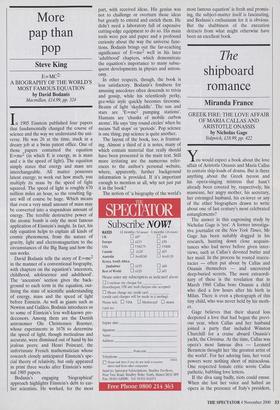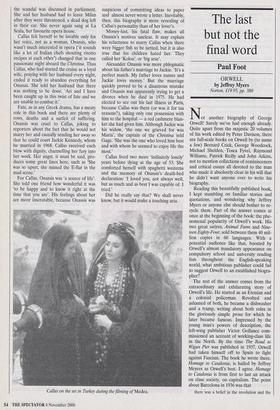The
shipboard romance
Miranda France
GREEK FIRE: THE LOVE AFFAIR OF MARIA CALLAS AND ARISTOTLE ONASSIS by Nicholas Gage Sidgwick, £18.99, pp. 422 You would expect a book about the love affair of Aristotle Onassis and Maria Callas to contain ship-loads of drama. But is there anything about the Greek tycoon and his opera-singing mistress that hasn't already been covered by, respectively, his masseuse, her angry mother, his secretary, her estranged husband, his ex-lover or any of the other biographers drawn to write about one of last century's most celebrated entanglements?
The answer in this engrossing study by Nicholas Gage is 'yes'. A former investiga- tive journalist on the New York Times, Mr Gage has been suitably dogged in his research, hunting down close acquain- tances who had never before given inter- views, such as Callas's devoted butler and her maid. In the process he routed inaccu- racies — often put about by Callas and Onassis themselves — and uncovered deep-buried secrets. The most extraordi- nary of these is the revelation that in March 1960 Callas bore Onassis a child who died a few hours after his birth in Milan. There is even a photograph of this tiny child, who was never held by his moth- er.
Gage believes that their shared loss deepened a love that had begun the previ- ous year, when Callas and her husband joined a party that included Winston Churchill for a cruise aboard Onassis's yacht, the Christina. At the time, Callas was opera's most famous diva — Leonard Bernstein thought her 'the greatest artist of the world'. For her adoring fans, her vocal powers were nothing short of miraculous. One respected female critic wrote Callas pathetic, babbling love letters.
If the diva sang badly, riots could ensue. When she lost her voice and halted an opera in the presence of Italy's president, the scandal was discussed in parliament. She and her husband had to leave Milan after they were threatened, a dead dog left in their car. She never again sang at La Scala, her favourite opera house.
Callas felt herself to be lovable only for her voice, not as a woman. Onassis, who wasn't much interested in opera (`it sounds like a lot of Italian chefs shouting risotto recipes at each other') changed that in one passionate night aboard the Christina. Thus Callas, who had started the cruise as a loyal wife, praying with her husband every night, ended it ready to abandon everything for Onassis. She told her husband that there was nothing to be done. 'Ari and I have been caught up in this twist of fate and we are unable to combat it.'
Fate, as in any Greek drama, has a meaty role in this book and there are plenty of rows, deaths and a surfeit of suffering. Onassis was cruel to Callas, joking to reporters about the fact that he would not many her and casually sending her away so that he could court Jackie Kennedy, whom he married in 1968. Callas received each blow with dignity, channelling her fury into her work. Her angst, it must be said, pro- duces some great lines here, such as 'She was so upset, she missed the E-flat in the mad scene.'
For Callas, Onassis was 'a source of life'. She told one friend how wonderful it was `to be happy and to know it right at the time that you are'. His feelings about her are more inscrutable, because Onassis was suspicious of committing ideas to paper and almost never wrote a letter. Inevitably, then, this biography is more revealing of Callas's personality than of her lover's.
Money-lust, his fatal flaw, makes all Onassis's motives unclear. It may explain his reluctance to many Callas when there were bigger fish to be netted, but it is also true that his children hated her. They called her `Kolou', or 'big arse'.
Alexander Onassis was more phlegmatic about his father's marriage to Jackie. 'It's a perfect match. My father loves names and Jackie loves money.' But the marriage quickly proved to be a disastrous mistake and Onassis was apparently trying to get a divorce when he died in 1975. He had elected to see out his last illness in Paris, because Callas was there (or was it for tax reasons?), taking only one possession with him to the hospital — a red cashmere blan- ket she had given him. Although Jackie was his widow, 'the one we grieved for was Maria', the captain of the Christina told Gage. 'She was the one who loved him best and with whom he seemed to enjoy life the most.'
Callas lived two more 'inifinitely lonely' years before dying at the age of 53. She comforted herself with spaghetti westerns and the memory of Onassis's death-bed declaration: 'I loved you, not always well, but as much and as best I was capable of. I tried.'
Did he really say that? We shall never know, but it would make a touching aria.



























































































 Previous page
Previous page